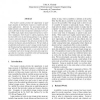Free Online Productivity Tools
i2Speak
i2Symbol
i2OCR
iTex2Img
iWeb2Print
iWeb2Shot
i2Type
iPdf2Split
iPdf2Merge
i2Bopomofo
i2Arabic
i2Style
i2Image
i2PDF
iLatex2Rtf
Sci2ools
DSN
2006
IEEE
2006
IEEE
Storage Allocation in Unreliable Peer-to-Peer Systems
Peer-to-peer systems provide the opportunity to pool large amounts of distributed resources to enable internetscale applications. However, the participant nodes are highly dynamic and unreliable. Thus, any shared resource such as file objects must incorporate redundancy to be useful. While many studies have proposed heuristics to determine redundancy levels based on object popularity, there has been little work in determining optimal or near-optimal resource allocation based on node reliability. In this paper, we present a strategy for the allocation of objects in the presence of dynamic and unreliable peers. We have built an availability model of peer-to-peer storage systems based on the bimodal and time-dependent availability characteristics of a P2P node. Using this model, we can select the size of a candidate node set for storage allocation and assign storage objects to maximize availability while still maintaining a balanced distribution of objects.
Computer Networks | DSN 2006 | Near-optimal Resource Allocation | Peer-to-peer Storage Systems | Time-dependent Availability Characteristics |
| Added | 11 Jun 2010 |
| Updated | 11 Jun 2010 |
| Type | Conference |
| Year | 2006 |
| Where | DSN |
| Authors | John A. Chandy |
Comments (0)

